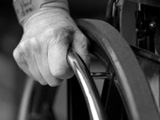|
|
TODAY.AZ / Weird / Interesting
Locked-in patients may be able to drive wheelchairs and surf internet by breathing
28 July 2010 [13:45] - TODAY.AZ
People with severe paralysis may soon be able to surf the internet or drive a wheelchair simply by breathing, according to scientists in Israel.
 Scientists at the Weizmann Institute of Science in Rehovot, Israel, are testing a “sniff detector” that is able to pick up pressure changes in the wearer’s nasal cavity and convert it into electrical signals. The device can then be hooked up to special software and used to move a curser on a computer screen or control a wheelchair.
Scientists at the Weizmann Institute of Science in Rehovot, Israel, are testing a “sniff detector” that is able to pick up pressure changes in the wearer’s nasal cavity and convert it into electrical signals. The device can then be hooked up to special software and used to move a curser on a computer screen or control a wheelchair. The device was tested on three people with locked-in syndrome, a paralysis that “locks” a fully intact mind into a paralysed body. One patient, a 51-year-old woman who was left unable to move, speak or blink after a stroke, was able to communicate for the first time using the new technology. After 19 days learning to produce a sniff on demand with 20 minutes of practice a day, she was able to write her family a message for the first time. To this day, the “sniff detector” remains her only means of expressing herself.
Another man, who had been "locked in” for 18 years following a car accident, wrote his own name within 20 minutes of using the device. Eleven other quadriplegics were also able to drive a wheelchair and surf the internet using the detector.
Noam Sobel, a neurobiologist at the Weizmann Institute, developed the device almost by accident. Dr Sobel, who usually studies the way the brain processes the sense of smell, said they came up with the idea after using a sniff-triggered olfactometer - a device that produces waves of smell.
“We noticed that sniffs are a very good and fast trigger," he told the US science publication Discover Magazine.
“It then simply dawned on us that instead of triggering odour, we could trigger anything: letters in a text writer or turns of a wheelchair. The rest just flowed or rather, rushed from there.”
Niels Birbaumer, at the University of Tubingen in Germany, said he was doubtful the sniff detector would work for completely locked-in patients. He told New Scientist Magazine that fully locked-in patients would not have enough control in their muscular system to work. Dr Sobel responded by saying the system was still in its development stages.
/Telegraph.co.uk/
URL: http://www.today.az/news/interesting/71512.html
 Print version
Print version
Views: 2530
Connect with us. Get latest news and updates.
See Also
- 06 December 2024 [22:20]
Are scented candles harmful to health? - 23 November 2024 [14:11]
Magnitude 4.5 earthquake hits Azerbaijan's Lachin - 20 November 2024 [23:30]
Launch vehicle with prototype of Starship made its sixth test flight - 27 October 2024 [09:00]
Fuel prices expected to rise in Sweden - 24 October 2024 [19:14]
Turkiye strikes terror targets in Iraq and Syria - 23 October 2024 [23:46]
Kazakhstan supplied almost entire volume of oil planned for 2024 to Germany in 9 months - 23 October 2024 [22:17]
Taiwan reported passage of Chinese Navy aircraft carrier near island - 23 October 2024 [21:50]
Russia remains largest oil supplier to India - 16 October 2024 [17:54]
Gamesummit co-founder shares insights on future of gaming industry in Azerbaijan [EXCLUSIVE] - 12 October 2024 [18:27]
TikTok cuts jobs, turns to AI for content moderation
Most Popular
 Azerbaijan, Colombia Discuss Cooperation in Various Fields
Azerbaijan, Colombia Discuss Cooperation in Various Fields
 West has no interest in him: the United States has disowned Vardanyan
West has no interest in him: the United States has disowned Vardanyan
 Azerbaijani delegation attends "Vietnam Defence Expo 2024" in Hanoi
Azerbaijani delegation attends "Vietnam Defence Expo 2024" in Hanoi
 Azerbaijan and Qatar strengthen environmental cooperation, says Minister
Azerbaijan and Qatar strengthen environmental cooperation, says Minister
 Armenian History in Crisis: Mirzoyan, Textbook and Colosseum
Armenian History in Crisis: Mirzoyan, Textbook and Colosseum
 Azerbaijan participates in 11th D8 Economic Cooperation Organization summit
Azerbaijan participates in 11th D8 Economic Cooperation Organization summit
 Azerbaijani and Turkish parliament speakers meet in Ankara
Azerbaijani and Turkish parliament speakers meet in Ankara
